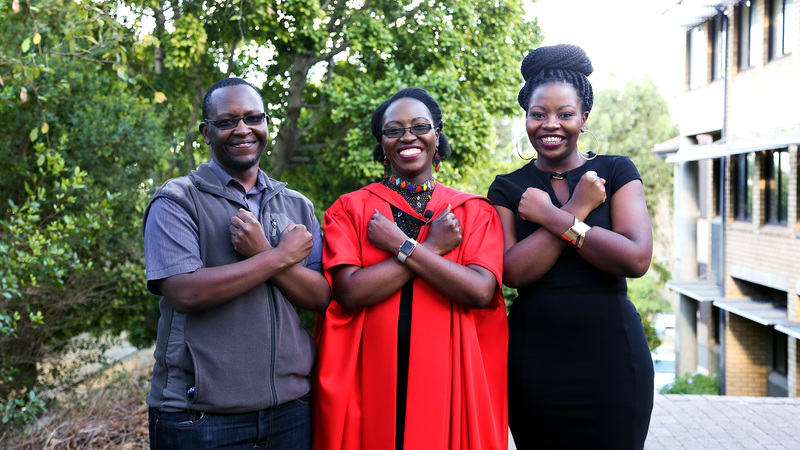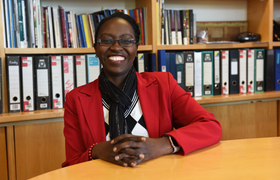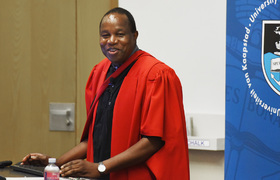Prioritise the public interest
05 April 2018 | Story Kate-Lyn Moore. Photos Je'Nine May. Read time 7 min.The importance of the public interest has been the central tenet of Professor Caroline Ncube’s formidable career.
The National Research Foundation-rated researcher has, among many other achievements, served as deputy dean of postgraduate studies and head of the Department of Commercial Law in the University of Cape Town’s Faculty of Law.
In her inaugural lecture, “The public interest in intellectual property law: African solutions to global challenges”, Ncube traversed her academic journey, gave an overview of her past and ongoing research success, and presented a snapshot of the themes that have emerged in intellectual property (IP) law over the past 16 years.
“A colloquial way of defining intellectual property is to say that it is any creation of the human mind,” she began.
“Intellectual property is ever present in our lives and we intersect with it almost without noticing. We create it and use intellectual property created by others all the time. Indeed, today all of us have had numerous encounters with it.”
To demonstrate the various ways in which individuals interact with IP works on a daily basis, Ncube asked attendees to think back to their morning routine.
“This morning you might have glanced at a newspaper, had some coffee, taken your multivitamins, brushed your teeth, had a 90-second shower and dressed before driving or catching a ride to wherever you needed to be.”
Each of these things was created by a human mind. IP laws protect the rights of this creator, author or innovation. In short, the IP law system governs different kinds of knowledge.
“The newspaper articles you read, including any pictures and illustrations, are protected by copyright. The coffee you drank may be sold under a big brand protected by a trademark. This also would apply to the toothpaste you used, the clothing you are wearing and the vehicle you rode in.
“The pharmaceutical make-up of your multivitamins is probably protected by patents, as is the water-saving shower head fitted on your shower.”
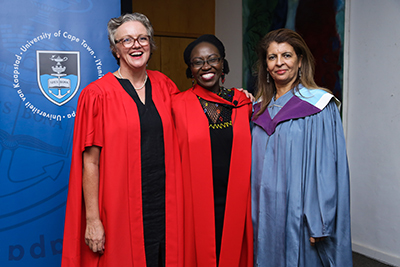
Promoting human rights
Ncube has published widely on IP in Africa. Her body of works holds as its centre that IP rights are exercised in an environment that prioritises certain values and is committed to protecting human life.
“As humanity, we collectively value human well-being and have a human rights framework that protects various aspects, such as the rights to dignity, life, health and education,” she explained.
How then does one balance the rights of individuals needing to access protected works, like medicine, or educational resources, with the rights of authors?
The answer, Ncube argued, lies in the notion of public interest.
But what exactly is the ‘public interest’?
“In my work, I have argued that it [the public interest] is the developmental aspirations that a country gives voice to through its constitution, laws, policies and plans,” she said.
Given that countries are at varied stages of development, and have unique systems of laws, it is clear why Ncube disagrees with a one-size-fits-all IP system.
IP laws, policies and plans should be uniquely crafted, while adhering to agreed international minimum standards of protection, she said.
Much of Ncube’s work has focused on answering the following questions: Who wants to access and use works and innovations, and why?
Consumption for day-to-day living – having food to eat, clothing to wear and technology to use – is one reason why we need to access works. Those looking to innovate further might also seek to access works, to fuel their own creative processes.
Ncube argued that the public interest should serve as the guide to create a fair system that facilitates access for these reasons.
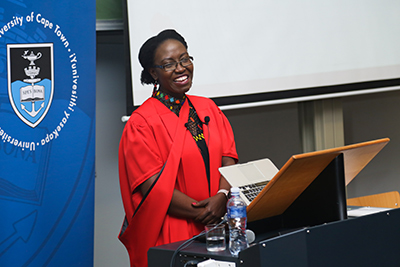
A balancing of interests
IP law is a balancing act. That much is clear from Article 15 of the International Covenant on Economic, Social and Cultural Rights, which forms the basis of the protection of IP rights.
“This article recognises the right of authors and innovators to benefit from protection of economic and moral interests in works they have created,” she explained.
But this same article also recognises the right of everyone to participate in and enjoy culture, and to benefit from scientific progress and its use.
This tension is perhaps most apparent in relation to patents and access to medicine.
“You will appreciate that when dealing with some widespread illnesses like HIV and AIDS and some illnesses that affect mostly the developing world, such as malaria and TB, we have quite a hotly contested policy space.”
But international minimum standards provide space for countries to make their own laws catering for the public interest in such instances.
Ncube’s own work has focused on assessing how South Africa is using these public interest mechanisms. She has argued that the patent protection requirements and the application process can be strengthened.
Shoehorn or custom fit
But not all kinds of knowledge fit into IP norms, Ncube noted.
She returned to her example of the morning routine. Suppose instead of a multivitamin, you took a herbal mixture that stemmed from the knowledge of an indigenous community, she said.
How can the law best protect indigenous knowledge and ensure that these communities have an equitable share in the benefits of their knowledge?
“There is tension between IP norms and African indigenous knowledge governance systems,” Ncube said.
For instance, classic copyright law supposes a single author, whereas the bedtime stories told to her by her grandmother and aunts were imagined by many members of the family – with each generation embellishing the tale.
“It is difficult to shoehorn this into copyright protection because there is no clearly identifiable author, nor is the story original.”
Instead of shoehorning such scenarios into existing IP law, one needs to custom-make protections, and these protections need to be informed by the existing governance systems of communities.
 This work is licensed under a Creative Commons Attribution-NoDerivatives 4.0 International License.
This work is licensed under a Creative Commons Attribution-NoDerivatives 4.0 International License.
Please view the republishing articles page for more information.


